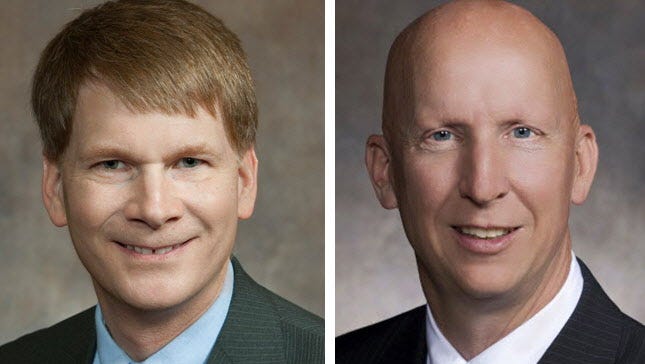Public school officials push back on bills aimed at slowing referendums
 Annysa Johnson
Annysa JohnsonMADISON - Public school officials from around the state voiced opposition Thursday to a slate of bills aimed at slowing the growth of property-tax-raising referendums, saying the measures would usurp local control and leave many districts — particularly small, rural, systems — in dire financial straits.

"If we've been irresponsible with our referendums, the voters have the opportunity to vote us out of office," Baraboo School Board Member Doug Mering told members of the Assembly's Education Committee during one of two public hearings on the bills Thursday.
Mering said the problem isn't the referendums, but inadequate state funding that forces districts to turn to their voters for additional revenue.
"The level of referendums would drop significantly if the state would get behind real education reform," he said.
A handful of supporters also testified, urging lawmakers to pass the measures.
“These referendums are just out of control. We’re spending way too much money, and our taxes are way too high,” said conservative activist Orville Seymer of the group Citizens for Responsible Government.
The two were among more than a dozen witnesses who testified before the education panel and the Senate's Committee on Government Operations, Technology and Consumer Protection, whose chairman, Sen. Duey Stroebel (R-Cedarburg), is spearheading what he calls the “referendum reform initiative” and is the lead sponsor of some of the bills.
EDITORIAL: Duey Stroebel is again attacking local government
Stroebel and Rep. David Murphy (R-Greenville) defended the bills on Thursday, calling them “common sense” measures that would add transparency and increase voter participation in the referendum process.
“School districts have the right to go to referendum, and they should,” said Stroebel, a developer and former school board member who has championed tax relief since joining the Legislature in 2011. “This does nothing to change that.”
Since 1990, Wisconsin school districts have passed more than 1,600 referendums totaling $12 billion — more than half of that in the last decade — pushing up local property taxes to pay for new and remodeled buildings, maintain and expand programs and services, and finance costly retirement benefits.
RELATED: Lawmakers offer slate of bills to rein in referendums
RELATED: 40 of 65 Wisconsin school referendums pass
RELATED: Voters reject spending referendum in district that spent reserves
Historically, the ballot questions were used primarily for capital projects. But districts have increasingly turned to referendums to raise operating revenue as their budgets were squeezed by a combination of state-imposed revenue caps, declining enrollments and hundreds of millions of dollars in cuts to state aid in recent years.
Last year alone, voters agreed to borrow $1.35 billion for capital projects, 10 times more than in 2011 and the most since 1993, according to the Wisconsin Taxpayers Alliance. Similarly, there were 71 requests to exceed revenue caps last year, up from an average 41 annually between 2009 and 2013.
Testimony Thursday focused on three bills.
They would:
- Require school boards to vote to go to referendum on a bond issue only at their annual meetings, when their tax levies are set, presumably because those are better-attended. A vote to go to referendum for operating revenue would have to occur at a regular monthly meeting, rather than a specially called session.
- Eliminate recurring referendums for operating expenses — those that raise taxes indefinitely — and cap non-recurring referendums at five years.
- Limit referendum questions to the regularly scheduled spring and fall elections, when voter turnout tends to be larger.
Three other referendum-related bills were not heard Thursday. Those would dock a district's aid by 20% of whatever it generates in an operating referendum; require districts to disclose the cost of debt service and interest payments on debt issues; and encourage cash financing of school maintenance and construction projects.
Stroebel suggested that some school districts schedule referendums votes at quickly noticed special meetings and special elections as a way to tilt the turnout in their favor.
“This is the kind of local control they want to defend,” he said.
Critics challenged the bills on a number of fronts, and Assembly members – several of them current or former school board members – appeared skeptical of the intent and effect of the bills.
“Your party isn’t exactly famous for increasing voter participation,” ranking Rep. Sondy Pope (D-Mt. Horeb) told Stroebel.
School board officials and lobbyists said the bills would have other, unintended consequences. Limiting the timing of votes and elections, for example, would create costly construction delays, they said.
And capping operating revenue referendums at five years would actually increase the number of referendums as districts return every five years just to maintain funding levels.
Dan Rossmiller, lobbyist for the Wisconsin Association of School Boards, questioned whether a provision that would impose a five-year cap on referendums already approved would be constitutional.
“We think this is an attempt to micromanage school districts,” he said.